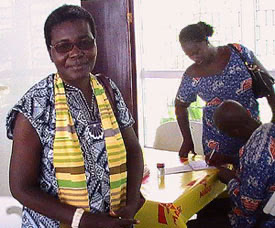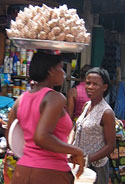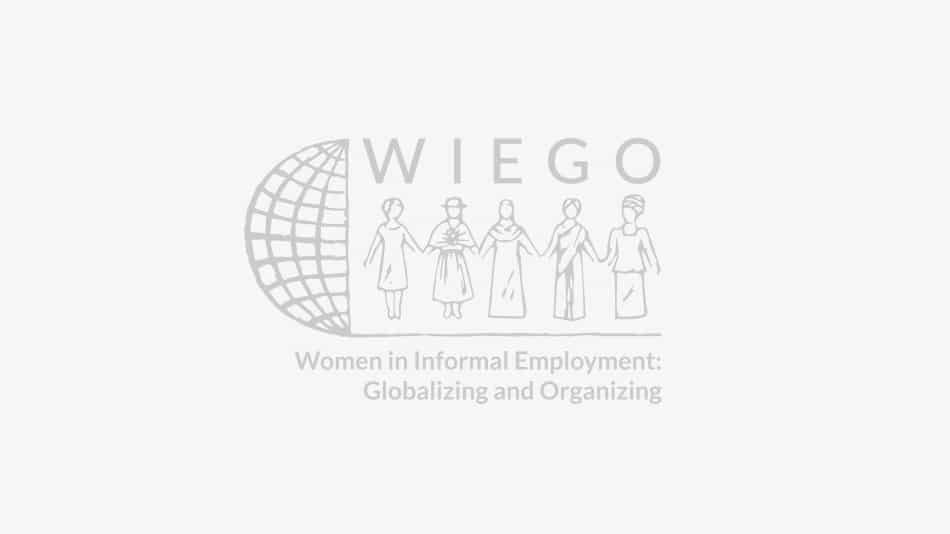Naana Adede, Accra, Ghana
 (2012) There is no running water at the Temas Station market in Accra, Ghana, but heavy rain has left dark puddles, rivulets of dirty water here and there that are beginning to dry in the heat. Nearby, a massive garbage bin overflows. Only a low shelf of tires separates this stinking heap from where food is prepared for a chop bar (a small eatery) in another part of the market.
(2012) There is no running water at the Temas Station market in Accra, Ghana, but heavy rain has left dark puddles, rivulets of dirty water here and there that are beginning to dry in the heat. Nearby, a massive garbage bin overflows. Only a low shelf of tires separates this stinking heap from where food is prepared for a chop bar (a small eatery) in another part of the market.
Naana Adede points to the garbage and explains that it may sit uncollected for more than a week, despite demands by the community of workers to have it picked up daily.
Right now, the only things collected daily are the taxes, and the tax collectors in their neat shirts and badges are easy to spot in this makeshift market.
"What are they doing for us?"
“They take the money,” Naana says in her soft, straightforward voice, “but what are they doing for us? They are not providing the services.” As she guides us through this informal market, she continuously points out the lack of infrastructure and sanitation.
 The Temas Station is host to hundreds of assigned stalls separated by slatted wood walls where vendors sell everything from shoes to fish to batteries, and chop bar operators sell food to local workers. But this is not an official market—rather, it is designated as a transport park. Today the government wants its share of revenue; tomorrow, the vendors know they could be evicted.
The Temas Station is host to hundreds of assigned stalls separated by slatted wood walls where vendors sell everything from shoes to fish to batteries, and chop bar operators sell food to local workers. But this is not an official market—rather, it is designated as a transport park. Today the government wants its share of revenue; tomorrow, the vendors know they could be evicted.
Drinking water in tetra packs can be bought from the kayayeis, young female head porters who carry the weight of large trays piled with the water on their heads. Access to water for washing, however, is limited; a chop bar operator must pay to use a tap another entrepreneur has put in. At the tap, they will fill a basin and carry it back to the space they rent, where it may serve as the only wash water they have for a full day.
The chop bar operators have many expenses. In addition to paying for water and paying the rent, they pay additional fees daily to operate. Many buy the raw food they use at a retail price because they lack the transportation to go to farms to buy it wholesale; and because they lack refrigeration, they must discard food before it spoils and buy more at the market every day. They also have to pay for refuse removal. They pay their staff a wage, and usually provide them with meals and sometimes with a place to sleep. As well, they must pay for health certificates for each employee on an annual basis.
Naana, herself a chop bar operator, says all the expenses can make it very hard to save anything for re-investment, or for the future. But she is doing much better than many.
We leave the unofficial market and cross the street to the Precious Minerals Marketing Company building, where Naana’s establishment is located. It is neat and bright, with colourful vinyl tablecloths that stand out against white surroundings. In a small clean kitchen, she and her staff (she employs eight workers) prepare and serve breakfast. Lunch is prepared at Naana’s home, where there is more room, and brought in.
She’s been a tenant here for a year, when she won a competition against more than 30 other applicants to establish her business in the building.
Her success in the competition was much more than luck. For nine years, Naana has been a member of the Indigenous Caterers Association.
“I knew the rules governing food because I was a member of an association,” she explains. “Every year I attend workshops that have enlightened me about sanitation and other issues.” That education and the board certification she has maintained were key to her winning the contract to operate in the Precious Minerals Marketing Company building.
The Indigenous Caterers Association has about 1,000 members throughout the country, 500 of whom are in Accra. Still, there are many more chop bar operators who do not belong, and who argue that attending a workshop would mean leaving their business and losing income. Naana is both sympathetic to and frustrated by that argument. The food industry, she says, makes an important contribution to the country. However, achieving recognition and better conditions will only happen if workers come together and make common demands.
Naana herself has experienced firsthand the power of joining together. “We were ignorant, but now we can stand up for ourselves because we have been educated,” she says. “The most important thing is being a member of our own organizations.”
WIEGO's Work on Indigenous Caterers
Between 2009-2010, WIEGO's Occupational Health & Safety project conducted research to find out more about the daily functioning of chop bar businesses in order to better understand the sector as a whole. It also sought to discover the major health and safety risks and hazards chop bar owners and their employees face, as well as discover the nature of workers’ access to health facilities.
Read the report Occupational Health & Safety for Indigenous Caterers in Accra Ghana by Laura Alfers and Ruth Abban.
